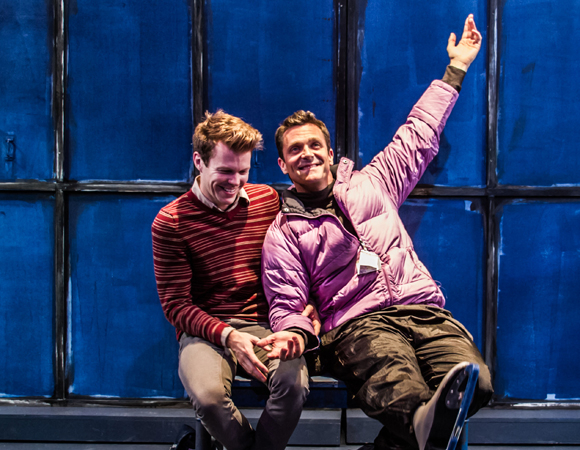
(© Sean Lambert Photography)
Despite a new location, L.A.'s Celebration Theatre continues to highlight new and popular works with gay, lesbian, bisexual, and transgender themes. The first work of their 31st season, the West Coast premiere of Philip Dawkins’ The Homosexuals, examines a tight circle of friends, mostly gay, with one self-proclaimed “fag hag,” as they relate to a freshly arrived Iowa boy. Director Michael Matthews employs a talented cast who masters Dawkins’ witty humor, making for an enjoyable evening, despite a troublesome story structure and shallow protagonist.
Dawkins shows great promise as a playwright as evidenced in the play. The dialogue, legitimately hilarious, is filled with insightful jokes about loneliness, dating, and gay sensibilities. A monologue that ends Act 1 daringly portrays a young boy attempting to relate to others with his naked body. It is a piercing speech by someone considered an outcast, an introvert without the ability to use words to relate. So well-written, these words are reminiscent of Paul’s groundbreaking speech of working in a seedy drag show in A Chorus Line.
Dawkins’ project is ambitious, and these attempts to be unusual are the play’s folly. He sets the play backwards, beginning in 2010 with our “hero,” Evan, dumping his flamboyant boyfriend, Peter. Each of the following scenes go back two years: Evan interacts with a different member of the entourage until the final scene back in 2000, arriving in the big city after coming out of the closet and meeting the friends. It is questionable as to why Dawkins sets the play in reverse chronological order other than as a gimmick. This element adds no nuance and is detrimental to Evan’s characterization. The audience never gets to see Evan grow. The first scene is Evan at his oldest, but he is no wiser than in any other scene through the years. The role is a cipher, one to which everyone is drawn but without the attributes to make his bewitching powers evident. Evan is essentially young and pretty. The audience gains a stronger understanding of every character but Evan, the one on whom the play supposedly focuses.
Brian Dare does his best to provide depth to Evan. His charm is warm and infectious. Responsible for the beautiful monologue concluding Act 1, Kurt Quinn is quirky, fidgety, and endearing as the awkward comic-book geek Michael. He may be too lovable since he builds Michael to be a worthy boyfriend, while the script keeps treating him as a loner. Ben Patterson is smarmy fun as the seductive British Mark. Butch Klein brings exuberance to the Tony Award-obsessed drama queen Peter. As the solo female, Kelly Schumann takes what could have been a cliché, the unattached schoolmarm with only gay friends, and humanizes her. The only one who suffers from the script is David Fraioli in a rage-filled but incoherent attack against Evan. There is little that Fraioli could have done with his scene, which appears to be crystal meth-induced. He is supposed to represent the older, AIDS-influenced generation but instead comes off like a deranged villain in a two-bit melodrama. Matt Crabtree chips at the surface of his character, Collin, Evan’s long-term boyfriend. Of all the characters, Collin has the least stage time and yet his interactions with Evan should have been more influencing in the script. Crabtree plays him with insecurity and a bit of courage, making me wish there was a lot more of his role.
After five scenes playing solo with Brian Dare, the entire cast comes together and has delightful chemistry as a group. How refreshing and fulfilling it would have been had the audience spent more time with them together. The play’s themes, muddled at this point, may have been more illuminated. But at this time, The Homosexuals is Merrily We Roll Along, the seminal backwards musical flop, sans its best element, Stephen Sondheim’s magnificent score.









